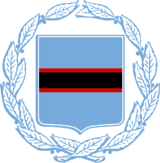Garetolian language
This article is incomplete because it is pending further input from participants, or it is a work-in-progress by one author. Please comment on this article's talk page to share your input, comments and questions. Note: To contribute to this article, you may need to seek help from the author(s) of this page. |
| Garetolian | |
|---|---|
| re'Karātōl'ikī | |
| Native to | Garetolia |
| Region | Oceania |
Native speakers | 212 thousand (2019) |
| Official status | |
Official language in | |
| Regulated by | Garetolian Language Comission (GALACOM) |
| Language codes | |
| ISO 639-1 | kt |
| ISO 639-2 | kat |
| ISO 639-3 | kat |
Garetolian (re'Karātōl'ikī, pronounced [reʔkaˌraːˈtoːlʔikiː]) is a Polynesian language of the Austronesian language family that takes its name from Garetolia, the country in which it is spoken. Garetolian, along with English, is an official language of Garetolia. It was discovered as one of the six spoken languages of Garetolia in 1775 by James Cook and his crewmembers. Today, only two of those languages remain spoken on a daily basis.
From the start of the Garetolian Genocide to the mid-20th century, the amount of native Garetolian speakers decreased rapidly. In 1970, the percentage of Garetolian speakers on the islands was only 1.4%; in 1976, as a result, Governor René de l'Anse passed a law ensuring that Garetolian was offered as one of the secondary languages taught in schools. After the independence of Garetolia, the Garetolian language was finally regulated and Prime Minister Meleno Keresa announced that "[Garetolia's] culture [could] finally be rediscovered". Today, it is mandatory to learn Garetolian as part of the secondary school curriculum. In Ule'eka, students in primary school are recommended to begin learning Garetolian in the years immediately before secondary school, as to ease the learning process.
As opposed to Ka'ekian, which has a complex system of noun cases and verb conjugations, Garetolian has only four noun cases and one conjugation for each tense of each verb. This means that, much like Esperanto, the speaker is required to specify the subject of the sentence instead of languages like Spanish, in which the subject is implied based on the conjugation suffix (e.g. -o, -as, -amos, etc.).
The Garetolian alphabet has seventeen letters: five vowels (a, e, i, o, u, each with long and short forms), eleven consonants (da, ha, ka, la, ma, na, pa, ra, sa, ta, wa), and the glottal stop represented by an ʻokina or simply an apostrophe.
Name
Although it is known that the name Garetolia comes from an anglicized corruption of the indigenous word "re'Karātōl'ī", there is some debate as to what the indigenous word actually meant. Some accounts say that the word roughly translates to "the utopia", possibly citing the tropical environment and rich natural resources. Others have proposed that "re'Karātōl'ī" was either an older or colloquial version of the word "rakānol'ī" which means "outsiders". It is possible, though not widely accepted, that the native Garetolians had given the British a false name for the island, and that the native name had been lost to history during the Garetolian Genocide. Nonetheless, the former theory is the most accepted one and is the official etymology on many sites such as the British Library and the CIA World Factbook.
History
Phonology
Consonants
| Labial | Alveolar | Velar | Glottal | ||
|---|---|---|---|---|---|
| Nasal | m | n | |||
| Plosive | voiceless | p | t | k | |
| voiced | d | ||||
| Fricative | voiceless | s | h | ||
| voiced | |||||
| Tap | voiceless | ɾ | |||
| voiced | |||||
| Approximant | w | l | |||
Vowels
Garetolian has five short and five long vowels.
| Short | Long | |||||
|---|---|---|---|---|---|---|
| Front | Central | Back | Front | Central | Back | |
| Close | i | u | iː | uː | ||
| Mid | ɛ ~ e | ə | o | eː | oː | |
| Open | a | aː | ||||
